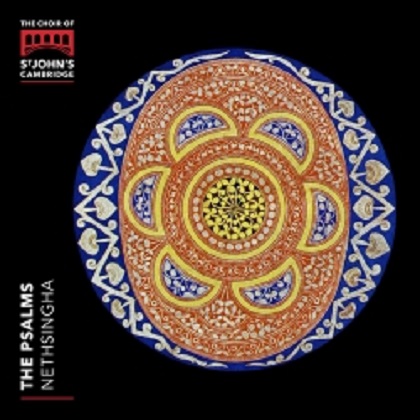This recent collection of psalms from the Choir of St John’s College, Cambridge is a fine tribute to the work of Andrew Nethsingha who has been its Director of Music since 2007 and is now about to take up a new appointment as Organist and Master of Choristers at Westminster Abbey. As one might expect from St John’s, where the singing of psalms forms a daily occurrence, the presentation is peerless, with blend, balance and intonation all beautifully manicured. Within the informative booklet notes (encompassing references from Beethoven to Feldman via Sibelius), Nethsingha comments, “Psalms are at the heart of our choir’s musical identity. They inform everything else we perform – technically, musically and emotionally. They are the best medium for a choir to communicate directly with members of a congregation”.

Certainly, the Psalms are a cornerstone of the scriptural canon, its timeless poetry cherished by countless listeners and singers, providing a day-to-day source of solace and joy. In his introduction to the 1932 Parish Psalter, Sydney Nicholson offers some guidance over the performance of psalm singing and states, “Every word must be pronounced clearly and with natural emphasis, as in deliberate reading”. His first recommendation seems both obvious and crucial to communication. Bearing in mind the words “natural emphasis”, why does Nethsingha wilfully go against natural recitation practised almost everywhere else in the British Isles. In what is an otherwise intelligently sung selection of morning and evening psalms, it seems bizarre that words should be treated in such a singular manner. I’m all for an individual approach to psalm singing (especially regarding choice of chants, tempi and whether verses are sung antiphonally), but the lengthening of certain vowels is surely counter-intuitive, distracting and leaves this listener searching for an explanation.
There are too many examples to mention, but vowel elongation simply disrupts the musical flow and interrupts the momentum like a ‘sleeping policeman’. Why is it necessary to lengthen the word ‘rage’ in the opening verse of Psalm 2 which begins, “Why do the heathen so furiously rage together …”? Likewise, the word ‘rock’ is given a similar ‘stretch limo’ treatment in Psalm 18: “I will love thee O Lord my strength: the Lord is my stony rock and my defence”. These pauses hinder prayerful communication, negate any sense of line and draw attention to a mannered style of delivery that is at best highly personal and worst, completely alien.
One last gripe is that every verse of the psalms is sung by the full choir, discarding the more usual antiphonal presentation where each half of the psalm is sung by voices on decani first and then cantoris. I don’t buy into Nethsingha’s full psalm singing or the reasoning behind his decision. He claims, “It is because of the visual communication and rapport between singers, who stand in straight rows facing one another, that my current preference is for psalm verses to be sung by the full choir, rather than using the equally beautiful tradition of singing in alternation from side to side”. Full psalm singing seems to me to be an aberration. A much earlier recording from the Choir of St John’s under George Guest (Decca, 1978) entitled ‘Psalms of Consolation and Hope’ presents a more conventional performance style. Both discs include Psalm 139, each time sung to the chant by Skeats. Nethsingha presents a much smoother rendition than Guest, but the latter opts for antiphonal singing in quarters, thereby reinforcing the parallelism in the text. Vowel elongation is conspicuous by its absence.
While Nethsingha’s style may not be to everyone’s taste, the singing from the boys and men is exemplary and the choir’s musicianship beyond compare. Notwithstanding the vowel lengthening, words are unfailingly clear and endowed with meaning. Psalms are well chosen with a wide expressive range and good use is made of single, double and triple chants, the whole variously spanning the 18th century through to the present. There’s much to enjoy in the drama of Psalm 18 where chants by Henry Gauntlett (1805-1876) and William Hine (1687-1730) are well coupled, and the chant by Alan Hemmings perfectly captures the yearning within Psalm 85, sung with melting tenderness. Scorn is deftly caught in the Charles Hylton Stewart chant (Psalm 52), and just the right degree of awe and jubilation is evoked by Robert Ashfield in his triple chant for Psalm 76. Christopher Robinson’s chants for Psalms 2 and 148 reveal a more theatrical slant, the latter especially flamboyant. Organ accompaniments are both wonderfully supportive and subtle with numerous moments of solo colouring such as the countermelody in Psalm 88 to the chant by William Prendergast.
While these accounts are highly individual, this is still a magnificent compilation and provides a superb snapshot (albeit under 52 minutes) of a choir singing with demonstrable character, clarity and commitment.
David Truslove
Psalm 18 – Henry Gauntlett / William Hine, Psalm 99 – Percy Whitlock, Psalm 85 – Alan Hemmings, Psalm 76 – Robert Ashfield, Psalm 52 – Charles Hylton Stewart, Psalm 88 –
William Prendergast, Psalm 29 – Thomas Attwood, Psalm 2 – Christopher Robinson, Psalm 139 – Highmore Skeats Jr., Psalm 148 – Christopher Robinson, Psalm 121 – Henry Walford Davies, Psalm 122 – Ivor Atkins, Psalm 123 – William Crotch
The Choir of St John’s College, Cambridge, James Anderson-Besant (organ 6, 12, 13), Glen Dempsey (organ 1, 3, 7, 19), George Herbert (organ 2, 4, 5), Andrew Nethsingha (director)
Signum CD721 [51:48]